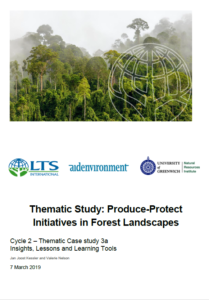This thematic study conducted by the Partnerships for Forests (P4F) Evaluation Manager (NIRAS-LTS International) to explore the strategically important area of “Produce-Protect” interventions within P4F. Within the study, use was made of a literature review and expert interviews as the basis for an assessment framework that was then applied to selected projects in P4F programme. The following are some of the key points that were derived from these project assessments; they illustrate the potential of the assessment framework for generating insights and specific recommendations. More detail is available in the full report.
- From the outset in project design, explicit mechanisms are needed to ensure that incentives and disincentives are linked to requirements for forest protection, and they should be subject to real-time monitoring and evaluation.
- In the early stages of a project there is a need to demonstrate whether agricultural intensification and proposed economic incentives will provide relevant landscape actors with living incomes and whether doing so will lead to changes in behaviour towards forests. It is also necessary to identify any additional conditions (e.g. land security) that need to be met to achieve zero deforestation.
- As part of project design, risk assessments should address the potential for proposed mechanisms to increase deforestation and, if necessary, mitigating measures should be integrated into project design.
- For effective landscape-scale governance, projects need to strengthen capacities among relevant landscape actors. To do so systematically, there is a need to agree on the principles and criteria for effective landscape governance, and private sector agencies should also provide incentives for effective governance.
- Scaling needs to focus on the wider uptake of effective design and implementation approaches rather than on the rollout of technologies or mechanisms that appear to have been successful in other contexts. Success depends strongly on the local and national contexts.
More detail is available in the full report. The report was completed in March 2019 to aid adaptive programming by P4F. The report is presented here for context and to share findings and aid learning by others working in the same area as P4F.


